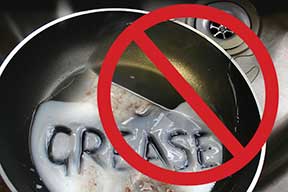 |
Previous Issues |
| Cedar Mill Community Website |
|
Search the Cedar Mill News: Search the Cedar Mill News
|
About The Cedar Mill News |
|
|||||||
| Volume 17, Issue 2 | February 2019 |
||||||
Steps Toward Sustainability
|
|||
 |
Your best solution? Avoid pouring fats, oils and grease down the drain to keep both your own pipes and public sewers free from clogs. To lighten up use of your garbage disposal and reduce the risk of an expensive public sewer clog, try to minimize food waste to start with, then compost in your backyard or in a worm bin.
Disposable Wipes: It might seem right to flush anything that you (ahem) wipe with, but in the case of pre-wetted fiber wipes, trash is best. Disposable wipes don’t break down over time like toilet paper does. Eventually, they can lead to clogged pipes and cause expensive—and time consuming—repairs for homeowners. And it’s not just homeowners that suffer—disposable wipes can clog public sewer pipes and pump station equipment too.
Your best solution? If you use these wipes, toss them in the trash.
RV Waste: It’s a big no-no to dump RV waste into the stormwater drain. Just like your home toilet waste water, the organic solids and dissolved nutrients in this waster can cause water quality problems in streams including bacterial and algal growth. Unlike your home toilet waste, RV waste dumped into the stormwater drain travels directly to streams and rivers without treatment to remove nutrients and neutralize bacteria. Even stormwater systems that use settling ponds to reduce sediment cannot handle nutrients and bacteria.
Your best solution? Use a designated disposal facility.
Household Hazardous Waste: Paint, soap and fertilizer can all harm human health, wildlife and ecosystems if used or disposed of incorrectly. Soaps and fertilizers increase the total load of nutrients in waste water, which can increase maintenance demands at the treatment plant too. Treatment systems aren’t designed to remove paints, solvents or pesticides, which may continue on into the stream when water is released.
Your best solution? Take your household hazardous waste including paint to Metro’s Central Facility for disposal at a low flat fee, or save it for a local household hazardous waste collection event.
Medicine: Flushing medications isn’t a good idea either. Pharmaceuticals and other commonly used personal care products can affect water quality. Water quality monitoring in many major cities shows an increase of chemicals such as caffeine, hormones and other common medications.
Your best solution? Take unused or expired medications to a police department or pharmacy drop box rather than flushing or trashing—it’s the safest way.
Pool and Hot Tub Water: According to Clean Water Services, “Pool and hot tub water contains high levels of chlorine and other contaminants that should never be dumped into the street or storm drains, because they flow to the nearest stream.” While it is true that chlorine is a micronutrient necessary to plant development, it occurs sufficiently in the natural environment to fill this purpose. Excess chlorine from flushing pools and hot tubs can build up in soil over time, leading to chlorine toxicity that can kill plants. Excess chlorides in streams and wetlands can be especially dangerous to fish and amphibians, hindering their ability to regulate the concentration of salt in their bodies and interfering with survival, growth and reproduction.
Your best solution? Learn how to treat and discharge this water properly when drainage is needed on the Clean Water Services’ website.
Dog Doo: Leaving poo on lawns and in parks allows it to wash away into streams, adding bacteria and nutrients to our waterways that don’t belong there (plus, it’s just rude).
Your best solution? The best place for dog doo is the garbage. Although biodegradable, dog doo isn’t welcome in your yard waste containers either as composting facilities aren’t set up to handle it. Trash, please!
![]()
Like us on Facebook for timely updates
Published monthly by Cedar Mill News LLC
Publisher/Editor:Virginia Bruce
info@cedarmillnews.com
PO Box 91061
Portland, Oregon 97291
© 2018